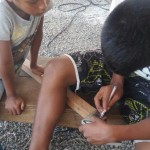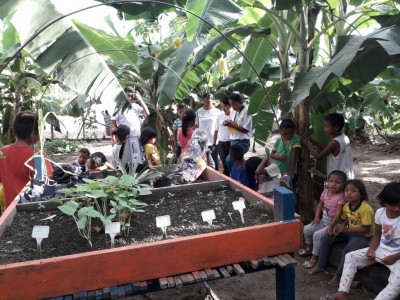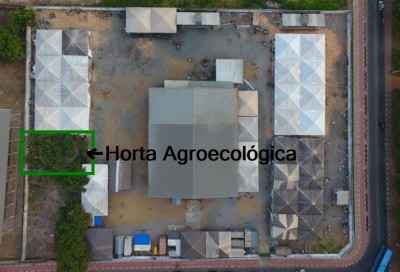 In a playful way, through carpentry and agroecology, indigenous children and youths acquire new abilities.
In a playful way, through carpentry and agroecology, indigenous children and youths acquire new abilities.
While they wait for the educational agroecology project to resume, the young natives of the Pintolândia Shelter, in Roraima, reinforce their ability in basic carpentry activities. They helped in the construction of a gate to protect the vegetable garden and are currently contributing in the building of supports for the gallons of water stored in the jerrycans used to disinfect the areas, a need that emerged from the demands for care with the coronavirus.
Friar Antonio Jazmin, a monk and missionary of the Fraternity – International Humanitarian Federation (FIHF), and responsible for the activities, explains that in all the process of construction, there are several skills that are being integrated, such as learning to count, to measure centimeters and meters, to add and subtract. The children experience ideas about abstract thought, spatial awareness, symmetry, volumes (height, length, vertical, horizontal, diagonal, perpendicular, etc.). They also experience their fine motor skills, among other abilities.
“During the activity, the young people are encouraged in positive habits such as order, cleanliness, concentration, precautions, responsibility, respectful relationship with others and with themselves,” emphasizes the Friar.
While the young people do carpentry work, the little children attentively observe each detail and take in the rich experiences through observation.
Friar Antonio Jazmin highlights that simple activities such as these are important, because their real value is in the transcendence. “We do not focus our activities only on the final result, which is the building itself, but rather in all the experience had during the process. We dedicate ourselves to having each participant feel themselves stimulated, valued, capable, with no judgments.”
Activities carried out before the Coronavirus pandemic
Educational Agroecology
Activities carried out before the Coronavirus pandemic
The area for educational agroecology was created so that children could experience moments of contact with nature, could learn to grow their food, could get to know the value of pure seeds without any genetic modifications.
“To work with agroecology is a way of reconnecting with the wisdom of the earth. It helps to decompress the psychological pressure of those going through the challenge of immigration and a shelter situation,” defines the Friar.
Atividades realizadas antes da pandemia do Coronavírus
The initial project anticipated activities with children and adolescents from 3 to 14 years old, and then involved the youth and adults. But with the involvement of the pandemic and the new and necessary care, the project had to be suspended until the planetary situation could be re-established.
“We experienced wonderful moments with the children on the day that we had the talk about the food that was directly harvested from the plants, such as papaya and banana. It was gratifying to see the joy of the children eating a food they had helped to plant, playing with the earth,” expressed Friar Antonio.
While the state of emergency triggered by the pandemic lasts, Friar Antonio Jazmin continues to look for support through projects and joint ventures so that, as soon as everything is resolved, the agroecology activities can be taken up again with strength and pride.
Activities carried out before the Coronavirus pandemic























